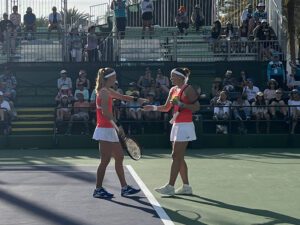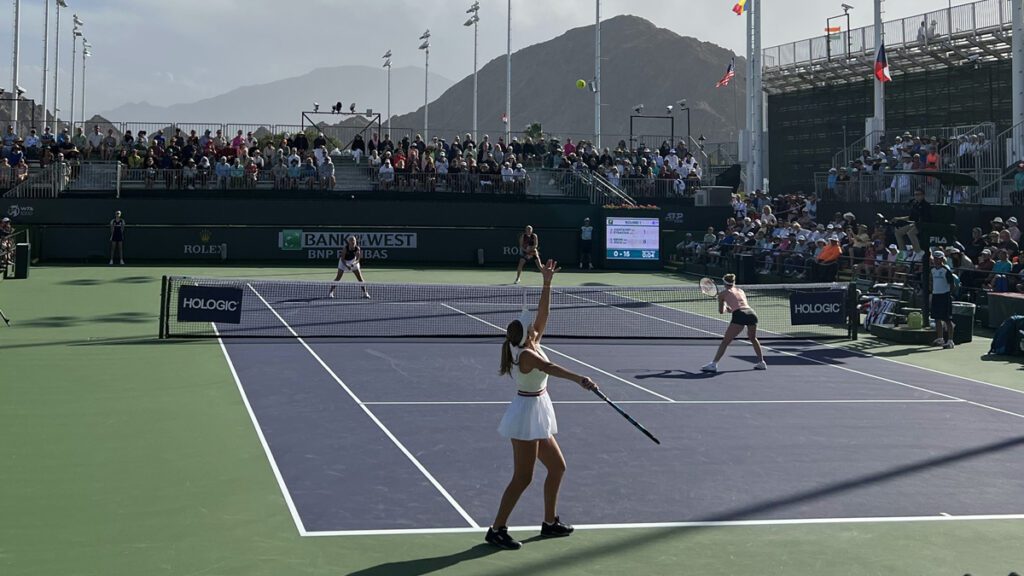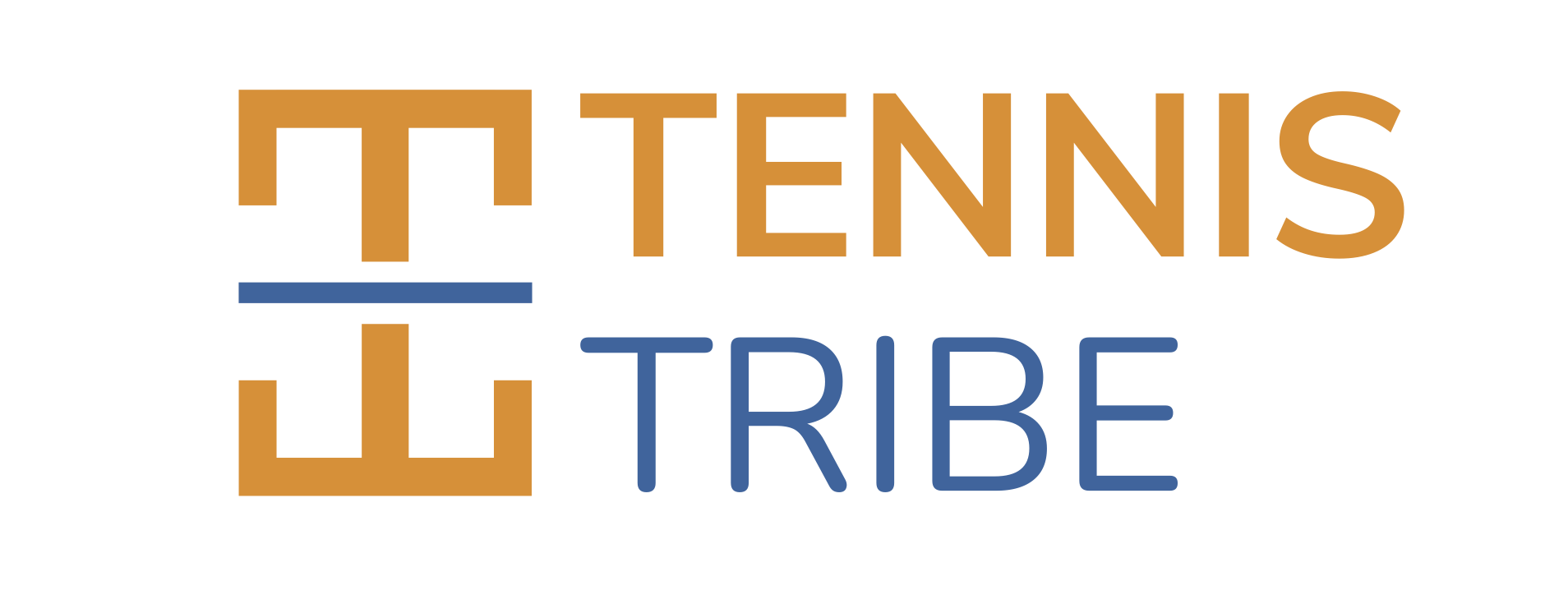You know those matches where nothing seems to be going right?
You’re missing forehand winners you usually make. The other team is getting all the breaks.
You’re not sure what to do to get things turned around, but you need to figure it out fast before it costs you the match.
Or maybe, it’s the offseason and you haven’t played in 3-4 weeks, so you just don’t have your game back yet.
Here are 6 easy-to-use rules I use to get out of a slump, get back on track, and start playing better.
Rule 1: Stay Positive On The Court
If you’re the type of player who gets emotional, that’s okay. What you can’t do is let your emotions affect you negatively.
Getting frustrated will keep you from seeing what’s happening in the match clearly. Take some deep breaths and ask what is actually going wrong. Getting into an emotional spiral will get you nowhere but playing worse.

Thinking positively and supporting your doubles partner will help you both start to play better faster.
I typically tell myself something like… “I don’t usually miss this many returns so it will definitely turn around soon.”
If you’ve ever watched the Bryan Brothers play, you’ve probably noticed how upbeat they are between points whether they’re winning or losing. There’s a reason they do that and you should too.
Related Podcast
Jorge Capestany Interview: Doubles Team Chemistry, Parter Mojo, and Drills from a USPTA & PTR Master Professional Coach
Rule 2: Aim Small, Miss BIG
Anytime you are not playing well or playing for the first time in a while, it will take a little bit to get your game back.
You need to work on hitting a good ball before hitting an accurate ball.
When you’re playing good, you can do what Mel Gibson does in The Patriot. Aim small, miss small.
But when you’re not playing so well, you should aim small, and allow yourself to miss big!
Put another way, aim well inside the baseline and sidelines, before going for big angles and down the line winners. At the net, hit the simple crosscourt volley instead of going for the difficult winner.
I actually start by just hitting everything crosscourt so I don’t have to think about where to hit it. This will allow me to focus on the quality of my shots instead of the direction.
If you miss big, then the ball might just be a winner 😉
Rule 3: Swing Small, Miss Small
The real key to winning matches when you haven’t been playing as much or playing bad is to simplify everything.
This means shorten your swing too. Shorten your backswing on your groundstrokes, simplify your serve, and keep a VERY short swing on your volley technique.
As you get into a rhythm and start to feel better, you can add a little extra pace and pop to your shots.
Rule 4: Two Second Serves
I double fault too much when I haven’t played in a while. It took me a few sets to realize this recently.
I had 2 double faults in 2 of my first 4 service games 🙁
Needless to say, I had trouble holding serve.
In doubles, you need to make a higher percentage of serves anyways, but when you’re just starting back, you really have to focus on this.
Hit your most trusted serve for a game or two before experimenting with others. Two second serves will make sure you don’t double fault games away like I did.

Rule 5: Focus On Your Footwork
99% of the time I’m playing bad, it’s because of my footwork. I didn’t forget how to hit a forehand or backhand, I’m just not getting into position.
Make a conscious effort to move your feet more.
I like to exaggerate and over-use my feet when I’m not playing well. I’ll shuffle my feet more, and take five small steps to get to the ball, instead of 2 big lunges.
It not only helps me play better, but it gets my energy level up too. My partner usually notices and feeds off it as well.
There’s never a bad time to focus on your feet, but when you’re not playing well, fixing your footwork is a MUST!
Rule 6: Forget About The Other Side Of The Net
The only way to turn around poor performance is focusing on yourself. You have to forget the other team and do what you can do to play better.
Ignore any poaching or movement from the other team. If you hit solid shots and they’re still putting balls away, then maybe they’re just a better doubles team.
You have to focus on playing your best and let the outcome take care of itself.
6 Rule Summary
Follow these simple rules and you’ll start playing better tennis faster and have your opponent wondering what happened.
The most important part of all this is to know exactly when to step it up.
When you get that short ball that you can normally take down the line for a winner, do you keep it crosscourt for now? or are you ready to rip it down the doubles alley?
That’s the battle we constantly face as tennis players. The self-awareness to know what we’re capable of, and more importantly, what we’re not.
The more accurate we can be with that self-awareness, the more we will be able to get out of our ability, and the more we will win.
What is your strategy to start playing better tennis when things aren’t going your way? Comment below…

This is good advice. If you’ve played for a while this always happens. Usually I would get too upset and try hitting harder.
In my 1st doubles match of this season, I hadn’t played much because of a respiratory illness. I was double faulting and not hitting my forehand well. I thought forehands were usually a decent shot for me. For some reason I didn’t get upset and just keep trying to get my serve in and hit cross court. I started to hit a few better shots but struggled with my serve the whole match.
Some how we won the 1st set 7-5 and lost the second 5-7. All I could think was we were fighting like dogs. My partner was very patient and believe it or not we were having fun.
We went into the 10 point tiebreaker and got down 4-7. I said to my partner, we can still come back. She quietly said “yes”. Amazingly enough we did and won 12-10 in the tiebreaker. It’s a match I will never forget. I never did play very consistent in the match it was up and down. We just kept fighting and kept working to keep the ball in play.
This experience is why I like tennis. Your doubles coaching is very helpful.
Thanks,
Sue
Thanks Sue! That sounds like a fun doubles match 🙂